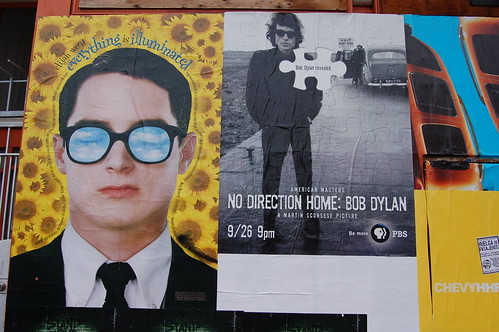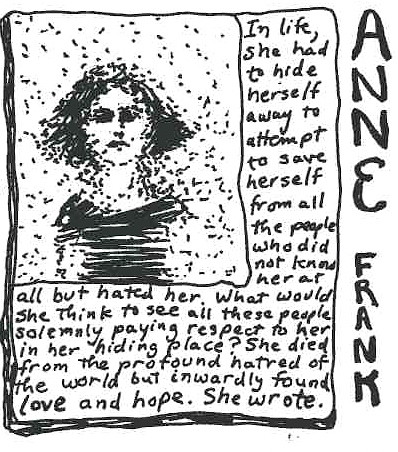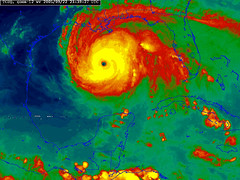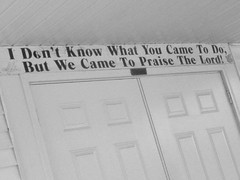You do not need to leave your room. Remain sitting at your table and listen. Do not even listen, simply wait, be quiet, still and solitary. The world will freely offer itself to you to be unmasked, it has no choice, it will roll in ecstasy at your feet. --FRANZ KAFKA
Thursday, September 29, 2005
THE STORY OF THE MONKEY JACKET
I met her a few years back at a party held by one of the waitresses from work. Now if you've ever hung out with restaurant people, you know we are some of the fiercest partiers around. Maybe it's all the energy that builds up watching other people enjoy themselves while we waitpeople stand around stoic and staid inside our tuxedo shirts. But meanwhile behind the solicitous smiles and the black vests, our hearts are beating out a meringue rhtythm.
So anyway it was a party. Someone had made expresso martinis; the obligatory joint was passed around.
"I heard you were a writer," the woman said as she approached. She had an exotic name, something like Sarina, though I can't specifically recall. Her clothes, too, were exotic, though her open face, and freckled cheeks were as familiar and bland as grass.
Well, yeah, I guess I am--at least by my own deluded definition. That's when she said she had a story she needed to tell me. Something I had to write.
I took another sip of my dark martini and started looking for an exit. I'd heard those kinds of stories before. Usually they involved elaborate plots for a science fiction novel or a detective story that sounded eerily like a movie I'd recently seen.
"Really?" I said, hating myself for my compulsive politeness. Couldn't I ever, just once, tell them I had so many of my own stories to tell that if I worked night and day for the rest of my life, I'd never run out?
But what really kept me from ducking away this time was Sarina's lack of preliminaries and her forthright stare. She had a story that needed to be written and I was the one who was going to do it.
"Do you believe that used clothes still have the vibrations of those who've worn them before?" she asked.
The answer was that I tried not to think about things like that too much. I mean, I'm crazy enough already. And if I accepted that, then I'd start wondering about the rooms I live in. Did they, too, possess the essence of those who once ate and slept, argued and danced in them?
No, I could not think about that. I already share my life with a bevy of ghosts as it is. Most of the time I call them my "characters".
But Sarina didn't really care how I answered. She'd already chosen me. Or rather the monkey jacket had chosen me.
Apparently, four years earlier, Sarina, who shopped only in vintage clothing stores, had come upon the mottled fur jacket, hanging on a rack. "Genuine monkey fur" the label proclaimed.
"I was so fascinated and repelled by it that I quickly left the store," she said.
She resisted the temptation to return for three days, but on the fourth day, she felt almost drawn against her will into the little shop.
The monkey jacket was now displayed in the window. Without allowing herself much thought, she told the proprietor that she would take it.
"Don't you want to see it first? Maybe try it on?" the stunned proprietor asked.
"I'm not going to wear it!" Sarina replied, aghast.
"Then it's a gift for someone," the owner said as she removed the jacket from the window and put it on the counter. She stroked the rough fur.
"Poor little monkeys."
“Yes, a gift.”
Sarina paid quickly--an exhorbitant price, far greater than what the tag had read the day before. But the young woman cloaked in layers of dead people's clothes didn't question it. See, she wasn't just buying the jacket; she was ransoming it.
"So that was four years ago?" I asked. "What did you do with it?"
"Well, nothing," she said. "I put it in a nice garment bag and stored it in my closet."
"And you've never worn it?"
"Of course not!" she said, summoning the horror she'd expressed to the woman in the shop. "I just kept it until I found the right person to give it to."
"And you think I'm--" I began, but choked on the rest of the sentence.
She was already nodding. "I want you to write about it."
"Write what exactly?" I asked. It sounded like a job for the likes of Edgar Allen Poe.
"You'll know," she said.
Fortunately, right about then, a friend pulled me away to meet someone else. I had another drink and when I looked around, Sarina had left.
But a few days later, I got a package in the mail. Even before I saw the return address, I knew who it was from. And what it was. Something in me instantly recoiled--perhaps the way Sarina had when she first spotted the jacket on the rack.
I promptly marked the package "Return to Sender," and ferried it to the post office. I then sent Sarina a note saying that I couldn't accept her extravagant gift. Nor could I write the story of the monkey jacket, because I didn't know it.
And yet somewhere inside me, I did. I knew exactly what the jacket looked like. It had a red liner and it was small enough to fit a child. Its collar was high and its fur dull, and yes, it had a slightly oily scent.
It was probably a few years ago that the story of the monkey jacket was passed to me, and I tried to say no to it. But could not. So here it is. Do with it what you will.
Tuesday, September 27, 2005
THE WOMAN ON THE BEACH: a short true story
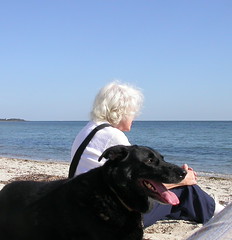
The calendar said it was fall, but it was a lie. Summer had stretched beyond its allotted days, confounding the town officials who would have posted an attendant to collect a parking fee if it could have predicted this free stretch of warm weather and wide open beaches. So I called my mother, who loves the beach beyond reason, and summoned my dogs who love it even more.
"Come on, we're going to the beach!"
The dogs regarded me skeptically. You're taking us to the beach? Is this some kind of trick?
So okay. I'm not all that much of a beach person. (That's right, I don't like vacations, and I'm not all that into sun and fun at home either--for the same reason. I'd rather stay home and write.) Call me a beach curmudgeon. I live 3 miles from the ocean, but aside from quick drivebys and the requisite oohs and aahs at the effects of moonlight on black water, I hardly ever go.
It's not that I'm immune to the beauty of the coastline, but looking out on it at work, as I do every day, seems to satisfy my soul's desire. As for the so-called activity known as "going to the beach--" my soul says no, thank you. For one thing the sand is hot and tends to migrate into whatever food you bring. And after you've lugged all your crap to your designated spot, you find your camp is invariably not as attractive or well equipped as that of the tanned and glowing people around you. And what's worse, neither are you.
Then, once you get there, and you've settled yourself in your little beach chair and slathered your skin with either sun repellent or sun attracter depending on your degree of recklessness, once you've opened your cooler and taken out your bottled water or your beer, what exactly do you do?
I know, I know. That is where the supposed beach book comes in. But I very rarely read books that could fit that description, and even if I did, I'd still be too distracted by the noise, the sand, the blinding sun to read more than a paragraph.
So that's it? I say to my beach loving friends. My beach loving mother? You pack all this gear, you trek through the sand, you eat sandy sandwiches--and then you just sit there?
"It's called relaxation," my mother informs me. But I just I shake my head, still not getting it. That's when she decides that I take after my grandfather who sat in the car and read the newspaper while his family frolicked on the beach. "Savage amusement," he called it.
So anyway, I was telling a story here before I got distracted by my aversion for "going to the beach". A story about a walk on a fall day that still felt as warm as summer. Now this I could handle. No gear involved except two leashes, and a lightweight camera. No idle sitting, except for a few minutes when my mother and the dogs sat inhaling their bliss (see photos above and below) while I entertained myself taking pictures of shells and stones as if I'd never seen them before.
Since the public area of the beach was still somewhat crowded, we ambled toward the private stretch where nearly all the homes were boarded up for the season. Jade (the shepherd/black lab mix) cooled off with a swim; Starsky (the Jack Russell) sniffed at the husks of horseshoe crabs and seaweed; and even the beach curmudgeon (me) took off her flip flops and waded in the water on the walk back.
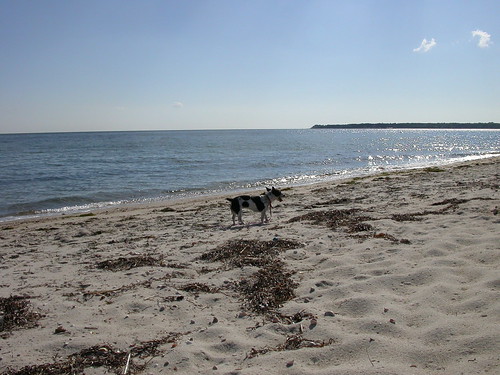
Then I spotted her ahead on the beach: the woman. One of the residents of the waterfront houses had come out and was sitting directly in our path. Since she had neither the requisite beach blanket nor chair, I assumed the decision to sit in this rather odd spot was directed at us. She wanted to remind us that this was a private beach. Her private beach.
Suddenly feeling angry at this disruption of our lovely hour, I put the dogs back on their leash, and continued walking, mentally rehearsing what I would say to this woman who thought she owned not just the view, and the sitting area of her stretch of beach, but the very coastline, maybe even the ocean itself.
"Just walking across the earth, sister," I planned to say, asserting my right to the beauty of the natural world. My mother's right. Even my dogs' right. My anger increased. Then I started to pity her for the negative emotions that must have driven her outside and made her sit her designer pants directly in the sand. Imagine living in such a head?
"Better to own nothing than to be obsessed with guarding one's property, to court dark emotions," I fumed as I got closer. I congratulated myself on how unlike her I was.
"Don't worry. We're just passing through," I would tell her as we walked past her beach.
And then suddenly we were upon her, but instead of the nastiness I imagined whirling in her skull, she turned and smiled. "Beautiful day, isn't it?"
"Uh, yes, beautiful day," I said, as I realized that the roiling emotions I had projected onto her, the negativity I had pitied and reviled was actually within me.
And as I sometimes do, I had allowed those feelings to mar a beautiful horizon, a moment that I would never get back... Amazing the things you can pick up while walking on the beach. Stones and shells and occasionally even a lesson about yourself.
Monday, September 26, 2005
THIS ALONE MADE THE DOCUMENTARY WORTH WATCHING
LIAM CLANCY to BOB DYLAN one night in a bar after about "100 pints of Guinness":
Never forget, Bob:
No fear.
No envy.
No meanness.
Me to myself after hearing that: Maybe we should all drink more Guinness.
Saturday, September 24, 2005
THE VERY BEST THING ABOUT WRITING
It's NOT the rare and wonderful days when perfect sentences and paragraph tumble fully formed from your brain, surprising even the writer with what they contain.
And it's also NOT the fact that (rumor has it) some people even make money from doing it.
No, what's truly the very best thing about writing is that sometimes it changes things.
An example? Shortly after hurricane Katrina ravaged New Orleans, I wrote about a special cab driver I'd met there, and how we'd vowed to keep in touch. Perhaps, a week or two later, my husband and I located Chris in Houston by cell phone. His home and livelihood had been ravaged, but he was grateful for the safety of his family. And I wrote about that, too.
But the truly amazing part of the story was that a couple of readers responded, offering to help Chris in various ways. A total stranger, one among millions who are suffering from this disaster. And all based on a little blog piece written by yet another total stranger. With news of scams all over the internet, I wasn't sure if they had followed through. To be honest, I'm not sure I would have had that kind of trust.
What happened next, I had no way of knowing. Until yesterday. That's when I received a letter from Chris thanking us for what we were able to send him. But his most profound gratitude was reserved for the "wonderful friends you brought into our lives at a time when we had nothing at all."
His letter also revealed that you, whoever among you did this amazing thing, gave him and his family much more than a material gift. You gave them a great gift of the spirit as well. Perhaps the very best gift of all. Chris referred to it as "the courage to fight on." I'm not sure, but I think it's otherwise known as Hope.
And so, to you anonymous giver (or givers) I forward Chris's deepest appreciation. But I suspect you feel as I do: incredibly grateful and humbled by the opportunity to be of use.
P.S. For those of you who have been following Chris's story, the brother and sister he was searching for have been safely located in Atlanta.
Friday, September 23, 2005
INSOMNIA
You may also know that I tend to regard TV as a dangerous device that sucks your mind and your time into a vortex. As for me, I choose to have my mind and time sucked into other vortexes--like say my computer. That, however, is fodder for another post
But despite my aversion for TV, I found the aftermath of Katrina necessary watching. And now with Rita approaching, I've once again resorted to the infernal mind sucking device to tell me what's going on. What I've been seeing has not been good for my insomniac tendencies.
Last night when I put one of the books I'm currently reading aside, and courted sleep, everything I'd seen and read came rushing back, a blur of Katrina and Rita that coalesced into images of flight. People carrying their lives in plastic bags from one state to the other. People stalled in traffic as they tried to do the right thing and evacuate, but instead finding themselves running out of gas and water. People who once had homes and jobs and lives sleeping on mattresses in shelters, guarding their plastic bags and their loved ones.
How many of us have watched them and asked ourselves, what would we take? Especially people like me, presently far away from the storm, but living in an area vulnerable to hurricanes. If we had to leave everything we owned to potential destruction within the next 24 hours, and could only choose what we could carry, what would it be?
I would want the writing that is my "life's work" of course, but that idea would quickly be jettisoned as impracticable. And what about irreplaceable family pictures and documents? Probably not those either--not when it comes down to survival. No, I'd probably take just food, water, perhaps a change of clothing, whatever money was on hand. Would I wish I had a gun?
And what about my animals? Would I leave them behind. The immediate answer is "Of course not! They're members of the family. Never!" The more considered response is that like so many who abandoned their dogs on the rooftops of New Orleans, I'd have to think of my children first.
Around four, Ted woke up and asked what was bothering me. "It's all the people wandering around the country tonight," I said. It's Governor Blanco, giving the blanket order to the already besieged residents of her state, Go north! It's the people caught in the snarl of traffic who found that there was no police presence, noone to help them."
And then we talked about all of it, all our night fears leaping up like shadows on the wall: The number and intensity of the hurricanes. The possibility that this was not a freak season, but the beginning of severe climactic changes caused by global warming. Should we sell the house and move inland, to some rural area where no terrorist attack or force of nature could trap us on this island where we live?
The answer is probably not. Like those holdouts in New Orleans who refused to choose what to take and what to leave behind, who could not part with pets or home, we will wait it out. We will see if this is just a fluke season and that somehow, even for those displaced and on the road tonight, life will soon be normal again.
For a more reasoned analysis of what, if anything, global warming has to do with our recent deadly weather, skip the ramblings of an insomniac, and read what scientists are saying.
Thursday, September 22, 2005
SECRETS OF THE HUMAN HEART
After reading about Post Secret in the New York Times, I quickly became a devotee. To anyone who hasn't yet visited the site, it's a blog that releases a trove of new secrets in the form of Post Card art every Sunday. No wonder the blog is rated # 8 on Technorati and "Frank," the administrator, recently got a book deal. Who among us can resist a good secret, especially when artfully exposed under the cover of complete anonymity?
But after a few weeks, I got a little bored. The secrets got, well, kind of repetitive. I started to talk back to the post cards: Is this all you've got, people? And come on, tell me something I havent heard.
So I stayed away for a while, and then returned. While I can't say the secrets were all that different, the expression was fresher. Or maybe my eyes were just fresher. I don't know.
Anyway, here's what I learned about the Secrets of the Human Heart by reading Post Secret.
They seem to fall into four categories:
1.We're not very good people. We harbor more grudges and feelings of jealousy than a city apartment harbors roaches; we litter and enjoy it; we go to church, but privately doubt God; sometimes we wish our family members were dead. And we are ashamed. We are very ashamed.
2. We do strange things to hurt ourselves. We cut ourselves, attempt suicide, seek destructive relationships, abuse substances of all kinds.
3. Other people have done things that hurt us, and we're ashamed of that too.
4. We love other people, or one specific person, but fear rejection or have already experienced it. We're ashamed of that, too.
Or even more concisely put:
1. We hurt other people.
2. Other people hurt us.
3. We hurt ourselves.
4. We're afraid to love. (Given #s 1 -3, I guess you could say #4 is pretty understandable.)
If you're a writer or an artist, that's what you've got to work with, the limited palette of human secrets. But another thing I learned reading Post Secret is that it's not really about the secrets. It's about the art.
Monday, September 19, 2005
A VERY PERSONAL CONFESSION
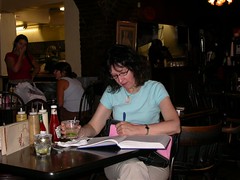 Cafe Maspero, Pen in one hand, martini in the other.
Cafe Maspero, Pen in one hand, martini in the other. All right, this is something I tell few people. See, people think I'm strange enough as it is. I try to make them understand my life, I really do, but I'm not surprised by the perplexed responses I get:
You mean you spend half the day with the shades down writing? And you make no money from it? Those little honorariums you get from literary magazines? No, those don't count, honey. We're talking real money here, the kind that pays the rent, fills the gas tank.
Then the other half of the day, you (unwisely) open the shades as you walk around the house thinking about your imaginary friends, excuse me, "characters". I see. Come to think of it, a couple of times I've seen you through the windows, nodding in agreement with this one, violently disagreeing with that one. Wouldn't it be more productive to, er, do a little dusting or something? Knit sweaters? Learn to speak Swedish maybe?
Explanations are useless. Either you get it or you don't. But here's a confession I've never made to my family, but which I decided to disclose for some unknown reason on the worldwide web: I hate vacations. I know a week in the islands, lying on the beach, drinking Bahama Mamas is some people's idea of a good time. But I'd rather stay home. Nor is the idea of traipsing around, dutifully eyeing every tourist attraction that any fool with a camera has already captured all that appealing. I mean, I don't altogether hate it, but still...I'm sorry, but I'd rather stay home.
Why? Because my work, that crazy and unrenumerative pursuit I've already described, is at home. And I love my work. More than a strip of white sand and some turquoise waters. More than the midnight buffet on a cruise. More even than the world's most avidly photographed attractions.
And besides, I live in an area frequented by tourists, and I frequently wonder how much they actually see. Sure, they visit all the right spots. As anyone in a tourist zone knows, they visit places that the natives never get around to checking out. Why? Because the natives are too busy living. Which brings me to my point:
I don't like vacations, but I absolutely love going to a new place to live for a week or two. The difference is that when you live in a place, you get up in the morning and go to work. You interact with the people of that place in a different way because they're working and so are you. You establish routines. And yeah, you'd love to go to some of those highly touted tourist attractions, but like the natives, you're too busy living.
This is where the great part of being a writer comes in, the part that almost makes up for the disapproval of friends and family, and the lack of monetary compensation. You can go absolutely anywhere in the world and LIVE there for a week or a month or as long as your budget allows. You don't even have to speak the language or get working papers, because you can carry your work in a leather satchel or a moleskine (as Bruce Chatwin famously did.)
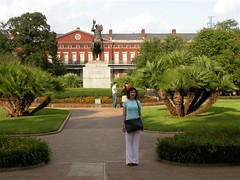 (Note the black satchel.)
(Note the black satchel.)Last October, in fact, I did exactly that in New Orleans. While my husband attended a weeklong conference, I got up early every morning and went to work. I wrote in Cafes and on benches in the shady area behind the French Market; one day I took the trolley and wrote on the beautiful campus of Loyola University. I wrote looking out on the Mississippi and late in the afternoon, I slunk into dark bars, ordered a martini from a table in the corner, and wrote some more.
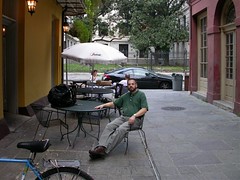 (Ted, trying out a potential writing spot for me)
(Ted, trying out a potential writing spot for me)I developed favorite spots where the staff recognized me, and knew my peculiarities. Most days I spent at least some time, scribbling on one of the benches in Jackson Square. There, I met musicians and painters and mimes, all of whom had come to do what I was doing: the work that some crazy God had given them to do. The work they loved more than a vacation. More than money. More than a week at the beach, drunk on Bahama Mamas.
And thus, I mourn New Orleans, a city and a people and a spirit that may or may not ever return in a particular way. I mourn it as someone who, however briefly, once lived there.
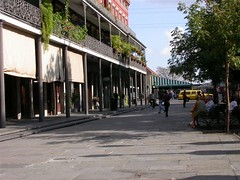
Thursday, September 15, 2005
THE RICH ARE DIFFERENT FROM YOU AND ME...
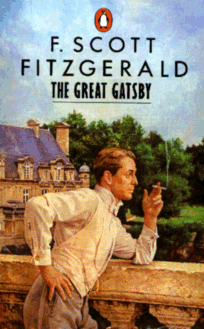
I'm sure Fitzgerald had more profound things to say, but that's the one that really hit me. Growing up in a mill town, I didn't know a helluva lot about the rich so I counted on people like F. Scott to fill me in. Come to think of it, I'm still counting on them.
Anyway, his helpful quote came to mind the other day when I worked a wedding that was extremely Gatsbyesque. The groom looked almost exactly like the guy in the picture, right down to the cool beige suit, complete with even cooler matching tennis shoes. As for his bride, she wore a chic sheath dress, her straight hair parted on the side as if it were an ordinary day. Rumor had it she hadn't even seen the wedding site before the event. Trusted employees had selected it for her. Hmmm...So the super rich play it super blase while dining on lobster and filet mignon beside the moonlit Atlantic. So that was why I've never had any money. I not only hate the color beige, I'm way too excitable. But I could learn. Honestly I could.
But it wasn't the bride or groom who tipped me off to the fact that this wedding was different from the usual upper middle class to nouveau riche affair held in the breathtaking spot where I work. It was the cupcakes. A phalanx of bakers arrived to arrange them on tiered platters in the morning, equipped with frostings in various flavors in color coordinated tubs and fresh coconut for flaking.
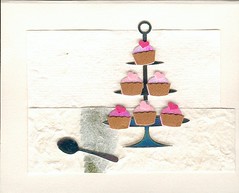
Collage by Beth Beckel
"But why not frost them back at the bakery?" I asked, after furtively dipping my finger in the fudge frosting when backs were turned. Mmmm...the delectable taste of high quality fudge made my waitress smile even friendlier than usual.
"Freshly frosted is simply better," the baker replied haughtily.
I thought of asking why, but didn't want to further betray my ignorance. Instead, I waited till he turned away and tested the lemon frosting. It was almost as good as the chocolate.
"Do you think I could get a drink?" the baker said, dropping the snob act, as a glob of coconut frosting hit the deck. "I'm under a lot of pressure here."
I wondered exactly how much pressure frosting cupcakes could be, but decided to press my advantage. "Sure," I said, "as long as you make sure I get a couple of those chocolate ones later."
"I'll take a Heineken," he said. I served up his icy cold beer and my to-go box on the same tray. Call it a case of mutual exploitation.
Anyway, this is what I learned about how the rich are different in the course of the wedding:
1. They were way too cool for the ritualistic traditions like bridal party introductions, first or last dances, or weepy parent waltzes, though they did manage one languid toast. And while I sometimes think I'm too cool for those rituals myself (for entirely different reasons) I found that without them, it seemed more like a tedious dinner party than a wedding. By the end of the night I was practically begging the elegant jazz ensemble to crank out Brick House and get things started.
But what really put this couple off was the clicking of glasses, demanding that they kiss. After a very forced smooch on his new bride's cheek, the groom promptly ordained that there would be no more of that. Then, as if to make certain, he left the table and avoided his wife for the rest of the evening.
2. While other people drink a variety of cocktails at a wedding, the super rich stick to wine exclusively during dinner, after which they switch to cognac type stuff in snifters. Ver-ry interesting. I'm sure Scott, as he preferred to be called, would be proud of my observations.
3. Despite all the advantages that plastic surgery can offer, the look and manner of old money doesn't age well. It may seem quite charming in young men like our bridegroom (who reminded me of some movie actor whose name eludes me)but what is lanky and cavalier in youth seems brittle and aloof as the decades pass.
"Take that away," the father of the groom, who wore a beige ensemble similar to his son's commanded, sccornfully gesturing at a plate of crustacean shells. He then returned to his conversation about an upcoming trip to Southeast Asia.
In the end, I failed Fitzgerald yet again by finding the mega-rich more baffling than godlike. By the end of the evening, I almost pitied the lonely bride in her well cut gown as she wandered through the tent alone, fending off the evening breeze by wrapping herself in her husband's beige jacket.
Was this lack of sentiment characteristic of the moneyed class, or merely of this particular couple? Was it even a lack of sentiment at all, or merely the reflection of two highly private and independent natures? Beats me.
So while I can't categorically say whether the rich are different than you and me, I am sure of one thing: they definitely have better cupcakes.
Tuesday, September 13, 2005
FICTION THAT MAKES ME WANT TO...
If there's anything in this world that makes me so excited that I want to get up and dance like they do in Brazil, it's good fiction. Fiction so fresh that the happy reader wouldn't be surprised to find a few tender shoots springing up between the pages. Fiction that makes you feel as if you've walked into one person's consciousness, pulled up a chair and really inhabited it.
Like falling in love, that kind of reading experience doesn't happen too often--which is probably a good thing. I mean, I can't dance like they do in Brazil all day every day.
Anyway, it seems like every week or two when I walk out of the library glowing and glittering with my newest cache of books, it always ends the same way. The
books that looked so promising on the shelves fall into four categories:
1. Virtuous Reading: The book's been well reviewed in all the right places and it would undoubtedly benefit my lazy mind and soul to read it. But after a paragraph or two, my mind and soul promptly decides it rather likes its slacker state.
2. Reasonably Satisfying Reading: It pulls me in sufficiently that I read in edible chunks every night before bed. But by the time I reach the middle, I'm forced to ask the big question: Do I really give a damn enough about these invented people to finish their story? Sometimes, if I'm in dutiful schoolgirl mode, I plod onward to the end. Since I've written a couple of novels (as yet unpublished) myself, I know how much proverbial blood and sweat goes into the process and a figure it's the least I can do. But most of the time, I'm a rebel school girl, and I toss it back in my library return basket with the already discarded virtuous reads. Why?
Because in both literature and love, I'm looking for passion. Reasonably satisfying just doesn't cut it.
3. Good novels. These are the ones I really like, enthusiastically recommend, and would never consider putting down before I finish the last paragraph. But neverin the course of reading them do they make me jump up and dance like they do in Brazil. They're good, they're well-behaved, but they never once pick me up by the lapels of my pajamas and shake me.
4. The Novels that readers live for. These are the ones with shoots of grass and the scent of curry, the feel of a tropical of breeze on your cheek trapped within their pages. These are the ones you hold up and shake in people's faces when they say fiction is dead or that no one reads any more.
Small Island by Andrea Levy is the first one that comes to mind, since I'm currently reading it.
A few more that have brought out my inner Brazilian dancer:
Brick Lane by Monica Ali
We Need to Talk About Kevin by Lionel Shriver
White Teeth by Zadie Smith
The Accidental by Ali Smith
Is anyone noticing a pattern here? Is it just me or is the U.K. producing the best fiction these days?
Monday, September 12, 2005
DOES INDEPENDENCE MAKE WOMEN MORE BEAUTIFUL?
Yikes. This is a topic my cousin, Ali, and I spent a lot of time talking about on our recent getaway: how independence--or its lack--manifests itself in every way--from outward physical appearance right down to the tenacity of the bones. Of course, we all know that to some extent. We recognize the beauty of independence when we see it. It is a straight back, an uplifted chin, a confident stride, that elusive and wonderful thing called flair. Never mind the legs; just look at the expression in Maria Sharapova's eyes!

Now in The Wall Street JournalEdvard Radzinsky has written a fascinating piece on what happened when the women of Russia broke free from age old beliefs that expressed themselves in maxims like "A chicken is not quite a bird and a woman is not quite a human being." Then were was this one: "A woman's happiness is to give; a man's happiness to receive."
According to Radzinsky the result has been a surge in national pulchritude. A generation of stunners have sprung from the wombs of their dough-faced babuschkaed forbears. Now that women are enjoying the happiness of receiving as well as giving, it's obviously a boon for the men of the society as well. Not only are they surrounded by gorgeous women, they will undoubtedly grow better looking themselves as they experience the joy of giving.
Ah yes, balance is a beautiful thing.
And speaking of the beauty of independence, check out our cat, Berlin, newly shorn of her mats and dread locks. I swear she's holding that head a little higher.
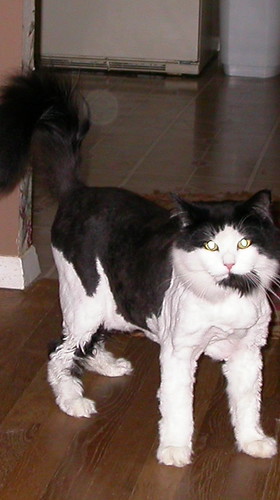
Thursday, September 08, 2005
ARISTOTLE AND ME: A Few Thoughts on Courage
See, I thought "philosophy" was what we did late at night around the dorm, after smoking a joint or two. But after an hour spent in the company of Spinoza and Kierkegarde, I was ready for a psychic refund. Philosophy was way too much abstract yada yada for my taste. I know, I know. The failure was undoubtedly mine. Nietsche and his ilk were just too smart for this aspiring poet from a factory town.
The only philosopher who made much sense to me was Aristotle. His words not only related to my life, they suggested a better way of living it. I was especially drawn to quotes like this one on courage:
"The more thou dost advance, the more thy feet pitfalls will meet. The Path that leadeth on is lighted by one fire- the light of daring burning in the heart. The more one dares, the more he shall obtain. The more he fears, the more that light shall pale - and that alone can guide."
I started composing this post in the pre-Katrina days which now feel almost like a bygone era, a more innocent time when we could never imagine that we would see corpses left to rot on an American street, or dazed children mouthing the words "food" and "water" into TV cameras as they sat on the sidewalk and waited. In the tumultuous days that have come between that early version of the post and this one, we have witnessed an amazing panoply of courage in action on our TV screens, as well shattering displays of its failure on both institutional and individual levels.
Aristotle's words have resonated more than ever:
Courage is the first of human qualities because it is the quality which guarantees the others.
And then there is this one:
"The greatest virtues are those which are most useful to other persons."
Most of the time, I don't think I'm a very courageous person. I've been known to be intimidated by a blank computer screen, a garden full of weeds, or a small child who refuses to put her shoes on. And yes, I think those things are failures of courage, too. So much of what we delay or fail to do occurs because we're afraid to try. Even ordinary things like weeding a garden or saying no to a request or honestly speaking our mind to someone close to us.
What do the every day small acts of courage against entropy and silence and our most private moments of despair have to do with the kind of heroic acts we witnessed amid the tragedy in New Orleans? According to Aristotle, quite a lot. According to him, courage is a muscle that is strengthened by every day use:
"Moral excellence comes about as a result of habit. We become just by doing just acts, temperate by doing temperate acts, brave by doing brave acts."
Do you have any idea how much hope that gives recalcitrant characters like mine? And when we think the constant struggle with the self, which often seems so futile (at least in my case) is not worth the effort, he has this to say:
"I count him braver who overcomes his desires than him who conquers his enemies; for the hardest victory is over self."
Maybe that philosophy class was worth the price of admission after all.
A P.S.: If anyone would like to share your thoughts on what courage is to you, either in the comment section or on your own blog, it might make for an interesting discussion.
Tuesday, September 06, 2005
PRAISE ALWAYS: A message from Chris
His home, his entire neighborhood is submerged under toxic waters; he has lost his means of making a living, and he is still desperately searching for a brother and sister whose whereabouts remain unknown.
"The state of the city, and the number of the dead is far worse than anything you see on TV," he said, his voice briefly cracking. "But I feel grateful to be alive, grateful that my children are safe. People have shown us so much love."
"What do you need?" my husband asked.
Briefly, Chris faltered, his needs so clearly overwhelming. "I try not to think about that," he said, attempting a laugh. "Because we need just about everything."
Then he told us how his son had broken down in a particularly vulnerable moment.
"Where will we go? What will we do now?" the son asked.
And Chris responded, "We'll be like Job. We'll praise God more than ever and he'll triple our bounty."
A quote from Mahalia Jackson which I found on Danyel Smith's wonderful blog this morning seems appropriate:
"It's easy to be independent when you got money. But to be independent when you haven't got a thing, that's the Lord's test."
Sunday, September 04, 2005
BECAUSE IT'S SUNDAY...
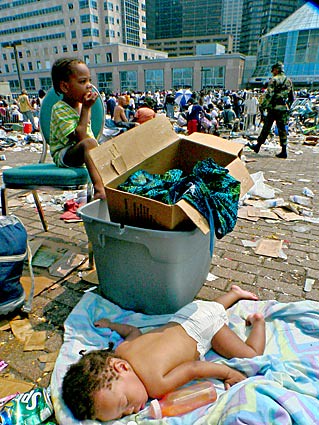
Byron Allen, 3, sits in a chair while his sister Cajah Allen, 1, lies on a blanket in the sun, waiting, with their mother, Ashanti Crayton, for evacuation, 9-2-05, by Karl Merton Ferron, Baltimore Sun, originally uploaded by Lotus Lynn.
I never intended The Marvelous Garden to be a political blog. There are others who do that more knowlegeably, more wittily, with far greater range and depth than I could bring to the subject. And besides, politics frequently divide, politics is often angry and disgruntled and venomous. In other words, it is not the kind of fertilizer I wanted for my garden.
And yet, there are moments when silence becomes an obscenity. When silence becomes complicity with the status quo. When ordinary waitresses and poets need to speak up, or compromise their humanity and be left fumbling for pathetic excuses in decades to come...Honestly, I didn't know what was going on, didn't see it, didn't hear a thing about it.
So here goes, another one of my lists:
6 THINGS YOU CAN DO TO HELP
1. Yeah, we can and should give money. But while we're writing that check or filling in those credit card numbers, I think that most of us realize that it is like offering an aspirin to someone who has a chronic disease. It may provide some temporary relief, but it is not the answer.
2. We need to watch TV. (This spoken from a person who watches probably three hours of television a year and usually views the thing as the great brain drain.) But during the Vietnam era, when television brought flag draped coffins and scenes from the battlefield into ordinary living rooms on a daily basis, the medium was partly responsible for changing history. I'm hoping that this is another such occasion.
3. If we belong to a religious tradition, we need to think about what it says about the treatment of the poor, about hypocrisy, about compassion--and we need to demand that our churches and temples act accordingly. We need to remember it isn't about what you SAY you believe, it's how those beliefs manifest themselves in the real world.
4. We need to be angry. Like television,
anger isn't something I ordinarily advise. But if ever there was a time for righteous anger, this is it. In Christian terms, the money changers are in the temple and they are desecrating the hell out of it.
5. We need to write letters, send e-mails, blog about it, talk about it, and use any other form of communication to help transform this moment of despair into one of hope and change.
6. We need to remember. In the coming days and weeks and months, there are many who hope we will forget what we saw and heard, that we will once again be anesthesized and confused and distracted by the advertising and trivia that pervades the airways, and we will forget the images of the abandoned people sitting outside the conference center waiting for food and water and hope.
But be assured that if we do that, what happened this week will happen again. And next time, we may be the ones who find ourselves sitting on the sidewalk, wondering what happened to the country we love.
Thursday, September 01, 2005
TWO CABBIES IN NEW ORLEANS
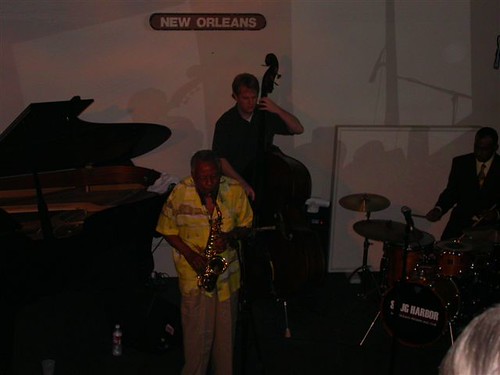
When my husband and I visited New Orleans last October, we met two cab drivers. One black, one white, both educated philosophical types (something like the cop I wrote about in my fender bender post). Both had a lot more to offer the fortunate traveler who hopped in the back of their respective taxis than a ride.
We met Chris the first day we arrived, and he told us that if we promised to use him every day of our stay, he would give us a special rate. That first night when he dropped us off at our destination, he waved away the money my husband tried to give him.
"Don't worry about that," he said. "We can settle up at the end of the week."
"But how do you know you'll ever see us again?" my husband asked.
Chris just chuckled. "After all the years I been doing this, I know."
"Don't you want my card at least? My room number?" My husband asked. Being from the north, we were immediately suspicious. This guy was saying he trusted us? What was the catch?
"Won't be necessary," Chris said, still chuckling as he climbed back in his cab. "See you tomorrow now."
And of course, we did. Over the course of the week, we rode with Chris every day, and every day the ride took us deeper into a genuine friendship with the man behind the wheel. We talked about our philosophies of family and work; even ventured into the potential minefields of faith and politics. Every subject seemed to expand our common ground. By the end of the week, the discussions had turned passionate as all three of us expressed open concern about the direction our country was heading. It turned out he had a master's degree in social work, but hadn't worked in his field in ten years when the funds were drastically cut.
"It's okay though. I got my cab, and my little house, and a good family. Even got a little savings in the bank. Every morning I wake up, I wake up thankful."
But when we drove past the neighborhood just beyond Louis Armstrong Park, Chris's expression changed. "There's a whole generation out there that's dying. People talk about the drugs and the guns, and yeah, those things are bad. But the real problem here is people got no hope. Can't live without hope." His sorrow was palpable.
When we told him it was our anniversary one night and that we'd made a reservation at a restaurant in the Quarter, Chris pulled the car to the side of the road.
"The Quarter's got some real fine restaurants and you can go there if you want, but a wedding anniversary, now that's something special. How about I drive you to the place where my wife and I have celebrated every anniversary for the last twenty years? Check out where the local people eat--and they won't empty your wallet either." That night, we enjoyed one of the finest meal I've ever had in memorable surroundings with great music leaping in the background.
But one night when the trolley we were riding broke down, we were unable to reach Chris. That's when we met the second cabbie, a man with a horselike face, and a low, morose voice that droned on like talk radio. When we pointed out the beauty of the architecture, he laughed caustically.
"Those buildings may look nice on the outside, but they're all rotting to the foundations. And it's not just the buildings. The whole city's on the verge of collapse. Economical. Structural. And moral." As he made his list, his voice boomed like an old testament prophet
My husband and I cast furtive glances at each other while the pessimist in the front seat expounded on the corruption of public officials, the school system, the state of Louisiana, and just about everything else.
We made polite murmurings, but were grateful to escape his tirade at the end of our ride.
The last day of our visit Chris drove us by his house, a modest but impeccably maintained bungalow, and introduced us to his wife. We'd heard so much about her over the course of the week that we already felt as if he knew her. As we drove to the airport, he kept negotiating the price for his services downward, while we figured a way to add the difference to his tip.
Just before he left, he scrawled his address and cell phone number on a piece of paper. "You keep in touch, okay?" he said. Then he hugged both of us and disappeared.
Of course, we've been thinking a lot about Chris in recent days. Even though there's no phone service in the city, my husband took out the crumpled piece of paper on which he'd written his phone number. But as we watched neighborhoods that looked distressingly like Chris's fill up with water, we knew it was futile.
And of course, we've been thinking of the other cabbie, too, and how he seemed to sink lower and lower in the driver's seat as he delivered one stinging indictment after the other against the powers that be and the fate of the city that he, in his own way, loved as much as Chris did.
Maybe we should all spend more time listening to cab drivers.

